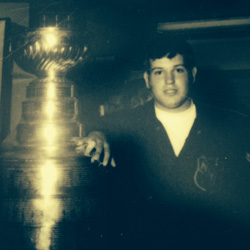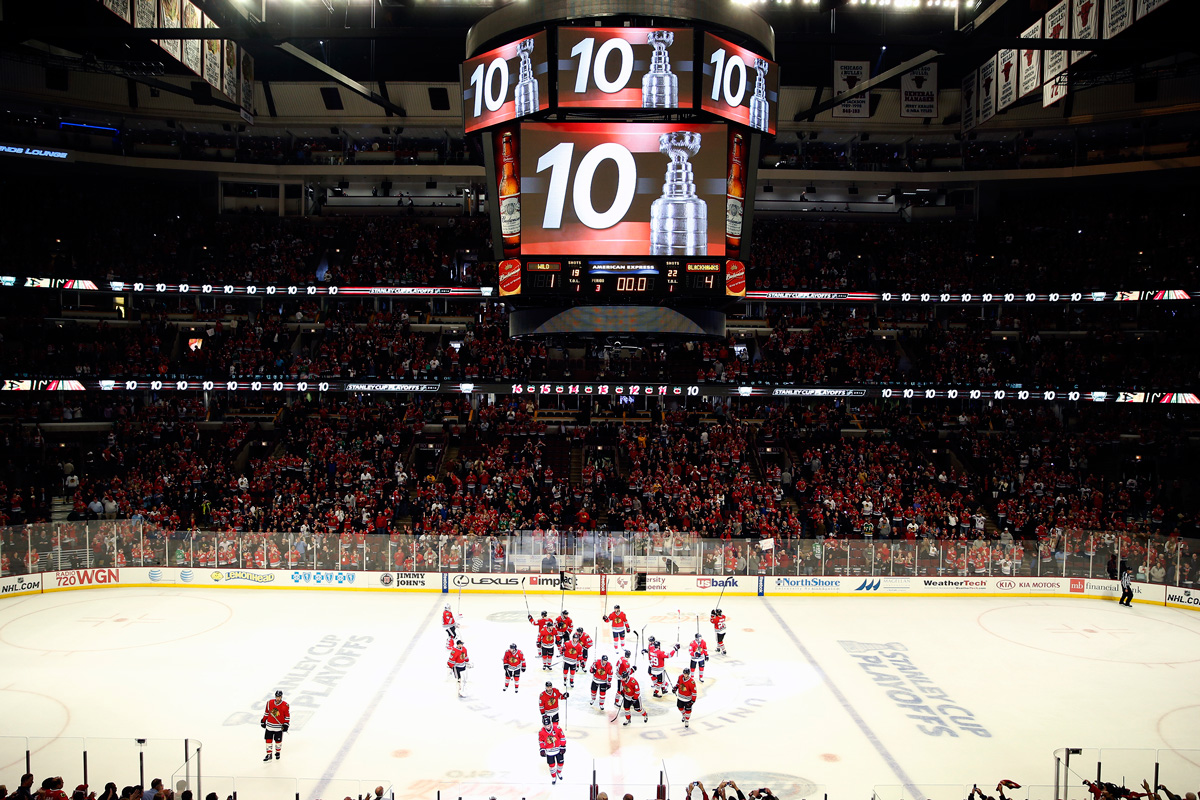Chicago has its share of dynasties. The Daleys. The Wirtzes. The Pritzkers.
But then there are the Rucks.
Since 1941 the extended Rucks family has owned a small piece of real estate, in a rough neighborhood—a seat between the penalty boxes at Chicago Stadium and the United Center—as official hockey timekeepers. (The timekeeper's job is to run the clock before the game as well as stop and restart it after every stoppage—pretty much every time an official blows a whistle.)

Their reign started when Paul Ruck, Sr., began working as an off-ice official soon after the bombing of Pearl Harbor in 1941. The family proceeded to take various positions within the organization: Paul Ruck, Jr., ran the pressbox for a while, and grandson Steve Ruck started in 1969 as the visiting team equipment manager. After taking time off to start his career in forensic estimating and launch a family, Steve returned in 1989 and has been a fixture ever since.
(Minor Blackhawks trivia: It was Paul Ruck, Jr., who helped a young Denis Savard learn English by reading the Daily Racing Form.)
But this year marks the last that the Rucks will occupy the famous seat as Steve has announced his retirement from the part-time position. At age 61, Ruck decided it was time to step away from the position that was taking up a bigger chunk of his life each year. Current off-ice officials Gary Speffenhagen and Bob Dyer, both of whom run the clock for about 10 games a year in order to be eligible in the playoffs should anything happen to Ruck, will likely split the time-keeping duties next year.
Chicago sat down with Ruck to talk about what it’s like to see the hockey game from the best—and occasionally worst—seat in the house.
What’s the start of your night like?
During the regular season, I get to the United Center about an hour and half before game time. For the Finals, they want us there two and a half. Normally we hang out in our room, but at this point in the year, the [National Hockey League] takes over the whole stadium. They ended up transforming our room into a studio, so all 14 of the off-ice officials sit over in the “feed bag”—where the stadium staff sets up the media buffet before the game. We haven’t been kicked out yet.
Around 55 minutes before game time, I set the clock at 40 minutes. Around the 16-minute mark, the warm-ups finish and I set the clock for 15 minutes. I let that run down, but I can’t let the horn go off when Gene Honda is announcing the Blackhawks starting lineup, so I stop the clock with about a second left.
What is it like to be down at ice level in between the penalty boxes?
The United Center was designed to replicate the old [Chicago Stadium] as much as possible. But it ends up being about four times as loud as the Stadium. Most of the sound is aimed downward and there’s no ceiling on the penalty box, so the penalty box ends up being twice as loud as the stands. We have some issues trying to hear the whistles.
There are microphones on each blue line and at the ends of the rink. Everything gets amplified, so if there’s some guy banging on the glass anywhere along the rink, I hear it.
Has technology helped improve the sound quality?
We’ve made a lot of strides in terms of sound. Other times things are simple. During the 2013 season, we were having trouble hearing the whistle. I’ve always been able to hear more clearly through earphones, so I went to Radio Shack and bought a sound repeater for about $30. I Velcroed it near the hole in the glass where the press photographer sits, and I could hear loud, sharp, sounds: the puck hitting sticks, skates on the ice, the officials blowing the whistle.
At some point, the league tech guy came saw the contraption, and he went nuts. "What the hell is that?" I told him about the problem we were having and he took down the information. At the start of the next season, the league sent out a memo requiring every team to get a repeater.
The league didn’t happen to name that after you, did they?
Nah. Half the guys can’t stand the things, so they probably hate my guts.
But really the only way to do the job is to watch the officials. Some people ask how the guy running the clock can miss a really spectacular play—it’s because I keep an eye on the officials all the time. As the puck is coming through the neutral zone, I’m watching the linesman to see if he blows the whistle for offside or waves his arms to signal that a play is good. Sightlines are really important. A lot of times on faceoffs, a defenseman will skate right in your way. You have to look around him, jump up and down, you do what you have to do. When there’s a big scramble around the net, you need to watch the referee because he’s the one who’s going to blow the whistle.
When might you end up on camera or in the spotlight?
When you see me on TV, that’s usually not a good thing. The officials are reviewing something upstairs, I’m resetting the clock, or I’m giving the official the headphones and they’re checking in with the "war room" in Toronto. Then all my friends all over the country start texting me, "You’re on TV!"
What memories stick out the most?
I was a little kid, seven years old, when the Blackhawks won the Cup in 1961. I was thinking, "Hell, what’s all the hubbub about?" I figured it out pretty quick.
In 1971 and 1973, the Canadiens won the Cup in the old Stadium. I was the equipment guy who worked the visiting dressing room and the visiting bench. Back before Gatorade, players sucked on oranges. We had to quarter the oranges and create a carrying pouch with some ice cubes. I’d get the stuff in a room and spread it out on a table. I’d make sure the spare sticks made it to the bench. Normally I worked the door closest to the Hawks bench. If the training staff needed anything, I’d just reach around the glass and grab it.

But in ’71 and ’73, it was surreal to see some game-changing moments and Chicago fans having their hearts broken. Having that chance to see the Stanley Cup paraded around in the old Stadium was really something else. But I didn’t have much time to stand around, I had to get back to the locker room to put everything away.
This sounds funny today, but there were no video cameras in the room. One reporter had a reel-to-reel and one had a camera. I managed to get the reporter with the camera to take a photo of me, but I never received it. For 40 years I thought he stiffed me! But after my dad passed away, I was going through my parents’ old pictures, and I found it. I swear finding that photo [pictured] was like finding a winning lottery ticket!
What is it that made you decide this was the year to hang up your NHL sport coat?
I’ve been leaning that way for a few years. If I’m busy with work, it’s tough to keep up. Last July, my wife’s oldest son had a baby—there’s another generation coming along, that’s exciting. I’ve been doing it for so long, I almost feel guilty because no one else has had a chance to do it.
Normally in the United Center, I get up and walk around between periods, but I can’t make a lap around that place—I know too many people. I always have to think about getting back to the clock. I’ve always got a phone alarm set for when I have to turn the clock back on. There’s a level of stress working at the United Center. I’m always wound up.
All of this dawned on me last December. My wife and I saw the Blackhawks farm team, the Ice Hogs, in Rockford. I got a beer and sat down during warm-ups. The only time I got up was for the anthem. I never moved. I just sat there and watched the whole game like a little kid. It was great.
The oldest guy on the crew, John Troppina, he’s been there since 1950. He watched me grow up as a kid. The other day he said, "You can’t quit." I had to tell him, I’m not dying, I’m retiring. I’ve got season tickets, I’ll come down and watch the game. When you have the game in your blood, you just want to be down there.
What’s it like to know you’re finishing up your time during the Stanley Cup Finals?
To be honest with you, I thought it [the Cup run] would be over by now. People have been saying to me, "You’re going out on top." If I do end up going out on top, I’ll let you know how it feels.



